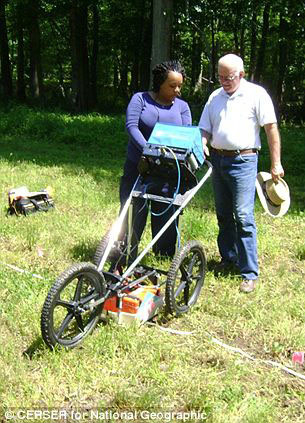Michael Cobb when he was SGA President at BCCC.
Beaufort County Community College graduate Michael R. Cobb recently participated in research that may have discovered the site of the long-sought-after Lost Colony.
Cobb, a 2011 BCCC graduate, was one of the researchers that performed underground radar searches of a site in Chowan County. The search unveiled clues leading some, including the National Geographic Society, to believe that 120 settlers from England may have ended up there after they left Roanoke Island.
Cobb participated in the research through the Center of Excellence in Remote Sensing and Education Research at Elizabeth City State University, where he was a student in the chemistry and pre-pharmacy program.
Cobb graduated from ECSU in May with a bachelor's degree in chemistry. He has been accepted into the master's degree program at North Carolina Agricultural and Technical State University and will begin his studies in January in pursuit of a master's in chemistry with a concentration in bio-analytical chemistry.
Cobb is serving this semester as a peer tutor with Student Support Services at BCCC.
A map created by John White reverals a possible location for the Lost Colony in recent tests. This discovery led researchers, including BCCC graduate Michael Cobb, to explore the site.
While at BCCC, Cobb served as vice president and president of the Student Government Association and was a member of BCCC's Minority Male Mentoring group. He is a volunteer with the Beaufort County Police Activities League, the Special Olympics and the Beaufort County Alzheimer's Education Fair and Walk.
Cobb participated in the research in the summer of 2013 but was prevented from speaking publicly about it until now, awaiting additional studies that have been undertaken at the site.
While the exact location of the site is not yet public, the site is on a river and has remained undeveloped over the last centuries.
Researchers were drawn to the site by a map drawn in 1585 by John White, an artist and friend of Sir Walter Raleigh, sponsor of the English settlement on Roanoke Island.
According to a report in the Daily Mail of London, tests found a hidden section of the map, drawn in a style of invisible ink and covered with paper, which provided a hint at the possible location of a fort.
Malcolm LeCompte, a research associate at ECSU, came up with the idea to use ground-penetrating radar, or GPR, alongside White's map to search for the fort.
Elizabeth City State University professor Malcom LeCompte teaches a student how to use a ground-penetrating radar machine to detect differences in the social structure underground.
Cobb was accepted into LeCompte's research program as an intern and not only worked on the site but also helped in the computer analysis of the findings.
Using a device that resembles a baby carriage, Cobb and his fellow researchers spent a day at the site covering the terrain in a grid-like pattern searching for abnormalities beneath the surface much like sonar does when searching for objects under water.
The researchers believe that the differences in surface structure on the site could indicate the creation of ditches that are different from those created by people native to the region.
The location of the colonial ground patterns in the modern images is the same as White's hidden fort on the 1585 map.
Cobb said the site would have been perfect for the settlers because they would have had access to an abundant supply of food and, while the site is conveniently located on a waterway, settlers could have easily seen large enemy ships approaching from a great distance and had time to prepare their defenses.
The research team also discovered shards of colonial ceramics as well as some small implements and shards of native pottery at the site, Cobb said.
Beaufort County Community College is a public comprehensive community college committed to accessible and affordable quality education, effective teaching, relevant training, and lifelong learning opportunities for the people served by the College.



